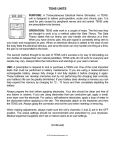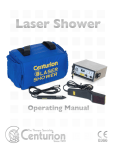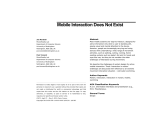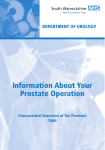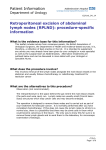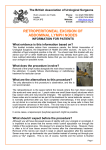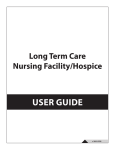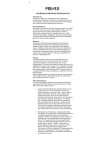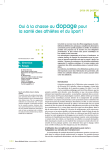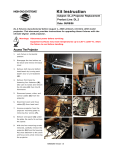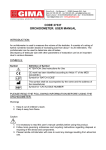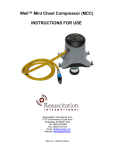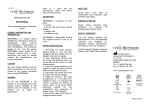Download Total penectomy
Transcript
Department of surgery Retroperitoneal lymph node dissection (RPLND) This information describes the operation to remove the residual lymph nodes at the back of the abdomen as part of your treatment for testicular cancer. This is a highly specialised operation which is only carried out in a few cancer centres. What are lymph nodes? The lymphatic system is a part of the body’s immune system which helps to fight infection. It also helps to remove excess fluid from the body. The lymphatic system consists of vessels similar to veins which carry the lymph around the body. Along its course are groups of nodes or glands. After passing through various nodes, the lymph is finally delivered into the blood stream. Cancer cells can be carried in the lymph fluid to the lymph nodes where they can grow as “secondary deposits” of cancer. This is what happens with testicular cancer that has spread outside the testicle. Diagram showing the location of the lymph nodes in the abdomen 461 Retroperitoneal lymph node dissection (RPLND) Page 1 of 7 Agreeing to treatment Consent The surgeon will have explained the operation and why you need to have it. This information is a permanent record of what has been explained. We advise you to read the information before you sign a consent form. When you feel you fully understand the operation and what is going to happen, we will ask you to sign a consent form agreeing to the treatment. What are the benefits of the operation? The CT scan you had after your chemotherapy treatment showed some enlarged lymph nodes in your abdomen. As these nodes are more than 1cm in size we recommend that the nodes are removed. Although the chemotherapy will kill most of the aggressive cancer cells, about 2 in 5 men with enlarged nodes will have a less aggressive form of the cancer remaining, and a smaller proportion, about 1 in 10, will have a more aggressive form of cancer. It is these nodes that need to be removed. The lymph nodes in the abdomen are most likely to be benign (not cancer). However, there is a chance that if they are left there they will either begin to grow or change back into another cancer which occurs in about 1 in 5 men. What are the risks of the operation? There are some risks that are common to all types of major surgery and some that are more specific to this operation: General risks of surgery include: • bleeding at the operation site • infection in the wound or chest • heart irregularities due to the anaesthetic and surgery • blood clots in the legs (DVT or deep vein thrombosis) or lungs (PE or pulmonary embolus) • poor wound healing or weakness in the wound site • bleeding and the need for BTS • injury to nearby nerves and tissues. Give up smoking! The surgery is planned in advance (not an emergency) so we take precautions to avoid these risks as much as possible. However if you are a smoker you can help by giving up smoking. There is a free smoking cessation service at The Christie, please ring 0161 446 8236. You can also contact Quitine on 0800 002200. Risks of RPLND Removing the lymph nodes from the abdomen can cause infertility in some men because of an effect called retrograde ejaculation. Retrograde ejaculation means that during sexual intercourse when you ejaculate or have an orgasm, the fluid (semen) that usually comes out of your penis goes backwards into your bladder instead. The semen is then passed 461 Retroperitoneal lymph node dissection (RPLND) Page 2 of 7 out harmlessly the next time you pass urine. But it means that it is highly unlikely you would be able to father children without having some medical help including storing sperm before you have the operation. It can be possible in this operation for the surgeon to lessen the risk of damaging the nerves by reducing the size of the surgical field (operation site). However, it is not always possible to do this after chemotherapy as the lymph nodes may be close to the nerve pathways. In some cases trying to preserve the nerves would increase the chances of leaving behind some of the lymph nodes. This would increase the possibility of the cancer coming back. If, in the future, you feel that your sex life has been affected by the surgery, please discuss this with your doctor or nurse. The affected lymph glands are usually stuck to the major blood vessels in the abdomen (the aorta or main artery and the vena cava or main vein). Also the blood vessels near to a kidney may also be closely involved with the lymph glands. If this is the case then there is a risk to the blood vessels and kidney and on rare occasions it may be necessary to repair or replace the major blood vessels with an artificial graft. In 1 in 10 to 1 in 20 men it may be necessary to remove a kidney. If either of these procedures is necessary it will not worsen your overall health once you have recovered from the operation. Are there any alternatives to the operation? The other treatment for testicular cancer is chemotherapy and you have already received this type of treatment. It may be possible to delay the operation and keep you under regular review using CT scans. The disadvantage of this is that in many cases it is impossible to tell whether there is active tumour present in the lump that we can see. Also, there is the possibility that the lymph nodes may become larger and more complicated to operate on in the future. What will happen if I do not have this operation? If you do not have the operation to remove the lymph nodes there is the possibility that the cancer will continue to grow and this may make any future chance of surgery more difficult or impossible. More seriously, there is a 1 in 5 chance that the lymph nodes will become cancerous again. If they do, this may be life-threatening. What does the operation involve? A cut (incision) is made along the middle of the abdomen extending from the bottom of the breastbone to the pubic region. Sometimes, it is necessary to extend the incision up on to the ribcage on the right or the left side. This will heal completely but it will leave a long scar. If the incision goes on to the chest there may be tenderness in the lower rib area after the operation. This is where the ribs have to heal. 461 Retroperitoneal lymph node dissection (RPLND) Page 3 of 7 Before the operation We will ask you to attend The Christie for assessment at the “pre-admission clinic”. At this clinic a healthcare professional will: • • • • • ask questions about your medical history assess your heart and lung function take a specimen of blood for analysis take swabs from your skin to make sure that you do not have an existing infection ask you if you have any questions about the operation. The date of your operation will have been given to you by the time you come to the preadmission clinic. You will be admitted to the ward the day before your operation when you will meet the other members of the team looking after you such as the anaesthetist, the ward nurses and ward doctor. Your stay in hospital will usually be about 7 to 10 days. After the operation • After you come out of theatre, staff will transfer you to the recovery area in theatre for an hour or two until you are moved to the critical care unit (CCU). Your stay in the CCU will probably last for 48 hours until you are ready to return to the main ward. The purpose of your stay in the CCU is to monitor your blood pressure, heart rate and fluid levels. • To reduce the pain in your abdomen after the operation ward staff will give you pain killers. The anaesthetist will discuss the options with you: - a painkiller device that you control, that releases painkillers into your blood stream via a drip (patient controlled analgesia), or - an epidural by which painkillers and local anaesthetic given directly into the spinal nerve system. This involves inserting a very fine plastic tube into your back through which these drugs are given. • After about two days the need for these types of painkiller is greatly reduced, and you will be able to have the systems removed. The ward staff will then give you painkilling tablets or injections instead. Please tell the staff looking after you if you are still in pain or discomfort as it may be that your medication needs to be altered. • You will have a drip running into a vein in your neck to give you fluids until you are able to drink normally (about 3 to 4 days after the operation). When you are able to drink you will then be allowed to start to eat again (about 4 to 6 days after surgery). 461 Retroperitoneal lymph node dissection (RPLND) Page 4 of 7 Physiotherapy After the operation the physiotherapists will visit you to teach you deep breathing and leg exercises. It is important that you carry out these exercises regularly as they will help to prevent a chest infection and blood clots in the legs that can occur whilst you are not as mobile as you would be normally. Drain If your operation has involved a cut that goes into your chest, the surgeon may need to put a drain into the side of your chest during the operation. This drain allows the lung, which would collapse during the surgery, to re-inflate. The drain normally stays in place for up to 3 days. A chest x-ray will be carried out to make sure that the lung has re-inflated before the drain is removed. A dressing will be put over the wound. The wound usually has stitches which are dissolvable. As well as a dressing on your wound, you will also have a drain (a small plastic tube) from your abdomen which drains away fluid from inside your wound. This will normally stay in place for 4-5 days. The amount of fluids that you can drink immediately after the operation will be restricted. This is to prevent you from being sick. You will gradually be able to drink and eat normally - usually about 4 days after the operation. Going home Most people stay in hospital for between 7 and 10 days after this operation. By the time you are ready to go home you will be looking after yourself without the need for help from others. However, you will feel tired when you get home and it is important that you rest as well as take gentle exercise such as walking. For a few weeks after surgery you will appreciate some time to recuperate and gradually get back to normal. This may take between 6 and 12 weeks. We will give you a letter to take for the district nurses and necessary tablets, such as painkillers, to take home. General advice after the operation Getting back to work - This depends on the type of work that you do but as a general rule you will probably need about 6 weeks off work. If your job involves manual work such as lifting then you will need about 12 weeks off work. If you are unsure about it ask the team looking after you. You can get a sick note for the time that you are in hospital from the ward staff. Your GP can give a sick note for the rest of the time you need to have off. If taking this amount of time off work will cause a financial problem for you we suggest that you contact our benefits advisor on 0161 446 3778 for more information on benefits that you can claim. 461 Retroperitoneal lymph node dissection (RPLND) Page 5 of 7 Lifting - be careful about what you lift such as sport and carrier bags and small children! For the first 6 weeks, try not to lift anything. Driving - Until you can safely carry out an emergency stop without it causing pain you should not attempt to drive. This will take about 4 to 6 weeks. Follow up We will give you an appointment to attend the outpatient department to see the surgeon about six weeks after the operation. At this appointment we will be able to give you the results of the findings from the laboratory of the specimen of lymph nodes that were removed at the time of the operation. Further follow up will be under the care of the consultant that gave you your chemotherapy. Contacts: Office hours Nurse Specialists: Jane Booker Sharon Capper Cath Pettersen 0161 446 8018 0161 446 3856 0161 918 7328 Out of hours: Ward 10 0161 446 3860 For further information Macmillan Cancer Support Freephone: 0808 808 0000 (Mon to Fri 9am to 8pm) Textphone: 0808 808 0121 www.macmillan.org.uk • • • • • • Benefits and financial information You may have had to stop work and had a reduction in your income. You may be able to get benefits or other financial help. No new claims for Disability Living Allowance can be made after April 2013 but you may be entitled to Personal Independence Payments. People over 65 may be able to claim Attendance Allowance. Find out more: Disability Living Allowance or Attendance Allowance, call the Disability Benefits Helpline on 08457 123 456 Personal Independence Payment (PIP), call the PIP Helpline on 0845 850 3322 Carer’s benefits, call the Carer’s Allowance Unit on 0845 608 4321. Contact The Christie at Withington general and benefits adviser on 0161 446 8539. The Christie at Oldham has a benefits advice session on Thursday afternoons phone 0161 918 7745. Contact your local social services department Macmillan Cancer Support has an advice line on 0808 808 00 00 or www.macmillan.org.uk 461 Retroperitoneal lymph node dissection (RPLND) Page 6 of 7 © 2014 The Christie NHS Foundation Trust. This document may be copied for use within the NHS only on the condition that The Christie NHS Foundation Trust is acknowledged as the creator. The Christie Patient Information Service April 2014 CHR/SUR/461/20.06.06 Version 4 Review April 2017 Tel: 0161 446 3000 www.christie.nhs.uk Details of the sources used are available, please contact [email protected] 461 Retroperitoneal lymph node dissection (RPLND) Page 7 of 7







